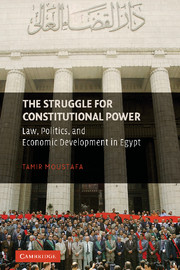Book contents
- Frontmatter
- Contents
- List of Figures and Tables
- Acknowledgments
- 1 Introduction: Law versus the State
- 2 The Politics of Domination: Law and Resistance in Authoritarian States
- 3 The Establishment of the Supreme Constitutional Court
- 4 The Emergence of Constitutional Power (1979–1990)
- 5 The Rapid Expansion of Constitutional Power (1991–1997)
- 6 Executive Retrenchment and an Uncertain Future (1998–2005)
- 7 Law, Development, and Democracy: A Critical Appraisal
- APPENDIX A SCC Justices and Commissioners
- APPENDIX B The Egyptian Constitution
- APPENDIX C Law 48 of 1979 Governing the Operations of the Supreme Constitutional Court of Egypt
- APPENDIX D Figures on Supreme Constitutional Court Rulings
- Bibliography
- Index
1 - Introduction: Law versus the State
Published online by Cambridge University Press: 27 July 2009
- Frontmatter
- Contents
- List of Figures and Tables
- Acknowledgments
- 1 Introduction: Law versus the State
- 2 The Politics of Domination: Law and Resistance in Authoritarian States
- 3 The Establishment of the Supreme Constitutional Court
- 4 The Emergence of Constitutional Power (1979–1990)
- 5 The Rapid Expansion of Constitutional Power (1991–1997)
- 6 Executive Retrenchment and an Uncertain Future (1998–2005)
- 7 Law, Development, and Democracy: A Critical Appraisal
- APPENDIX A SCC Justices and Commissioners
- APPENDIX B The Egyptian Constitution
- APPENDIX C Law 48 of 1979 Governing the Operations of the Supreme Constitutional Court of Egypt
- APPENDIX D Figures on Supreme Constitutional Court Rulings
- Bibliography
- Index
Summary
Why would an entrenched authoritarian regime establish an independent constitutional court with the power of judicial review? This is one of the most intriguing questions for students of contemporary Egyptian politics. In a country where the ruling regime exerts its influence on all facets of political and associational life, it granted the Supreme Constitutional Court (SCC) substantial autonomy from executive control. The paradox is all the more intriguing when one reviews the surprisingly bold rulings that the SCC delivered in a variety of areas over the past quarter-century. The Court consistently worked to curtail executive powers, expand freedom of expression, and shield groups active in civil society from state domination. Moreover, it provided the most important avenue for opposition parties, human rights groups, and political activists of every stripe to credibly challenge the Egyptian government for the first time since the 1952 military coup. Opposition parties used the SCC to contest electoral laws and strict constraints on political activity, human rights groups used the SCC to strengthen civil and human rights safeguards, leftists initiated litigation aimed at blocking the regime's privatization program, and even Islamists mobilized through the SCC to challenge the secular underpinnings of the state. In the process, the Supreme Constitutional Court stood at the center of the most heated debates concerning the political direction and even the fundamental identity of the Egyptian state.
- Type
- Chapter
- Information
- The Struggle for Constitutional PowerLaw, Politics, and Economic Development in Egypt, pp. 1 - 18Publisher: Cambridge University PressPrint publication year: 2007



